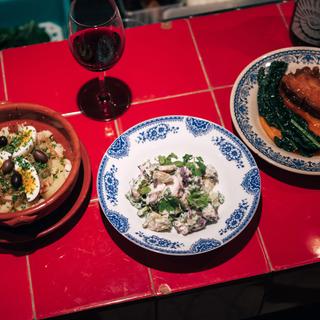


In Paris and its suburbs, Portuguese cuisine dances between popular dishes and reinvented classics
FeatureMany addresses in the Paris region offer traditional and hearty dishes such as octopus rice, red bean cassoulet and baked cod. This Lusitanian heritage is being revisited by a new generation of chefs.
Encouraged by the tourist influx, Portugal's major cities have seen their culinary offerings multiply over the past decade. In Lisbon or Porto, there is no shortage of good spots, from the most traditional bistros to trendy young chefs giving a fresh twist to the national repertoire. Sometimes considered the world's third Portuguese metropolis due to a community established since the post-war economic boom, Paris and its suburbs seemed to hide the culinary resources of Alentejo, Algarve or the mountainous north of Trás-os-Montes.
The streets of the French capital, as well as the inner and outer suburbs, are full of places to enjoy classics as flavorful as carne de porco à alentejana (pork with clams), feijoada (a type of red bean cassoulet), cozido (a type of pot-au-feu) or the countless recipes for bacalhau (cod). But these establishments often escaped the radar of French foodies and remained somewhat stuck in nostalgia. However, it's worth dusting down your address book, especially as a new generation of restaurateurs is shaking things up.
Not significantly present in France until the early 1960s, the Portuguese community grew from 20,000 people in 1958 to 750,000 by 1975. Before the Carnation Revolution in 1974, Paris and its region saw thousands of migrants arriving, fleeing poverty, António de Salazar's dictatorship and the colonial wars. "Many bars and restaurants were created at that time," explained Rafael Dos Santos, the 40-something owner of Sapinho, a new Portuguese establishment on Rue Lamarck in the 18th arrondissement of Paris, whose parents crossed the border illegally in the mid-1960s. "These canteens maintained a community link and provided tips. The cuisine, often rustic, had to fill workers on a budget who woke up early before returning to work on construction sites or in their taxis."
You have 78.61% of this article left to read. The rest is for subscribers only.
